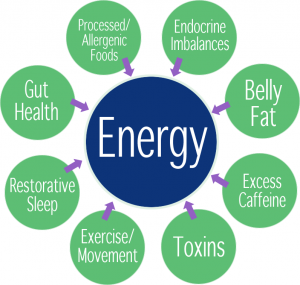In part 1 and 2 of this blog series, I’ve dealt with “Processed Foods, Food Sensitivities and Food Allergies” and “Caffeine and Sleep Quality.” While these are important considerations when it comes to what causes you to lose your get-up-and-go, you can’t forget how stress is sapping your energy every day.
Chronic stress, like dealing with commute traffic and being over-scheduled, certainly rob you of your vital energy day-in and day-out. You’re just not designed to be in a chronic stress state24/7.
Additionally, chronic stress taxes your little adrenal glands over time. The reason? Those are the glands that secrete your stress hormones, certain sex hormones and help manage blood sugar.
Being chronically stressed also sets you up for too much time in the “sympathetic” state, and not enough time in the “parasympathetic” state. When it comes to the sympathetic and parasympathetic systems, it’s all about balance. The sympathetic nervous system activates what is often termed the fight-or-flight response, increases heart rate, makes pupils dilate, and inhibits digestion. The parasympathetic state slows down the heart rate, stimulates digestion, and stimulates good liver and kidney function, among other things.
So you can see that if you are in the sympathetic state way too often, your ability to digest and absorb nutrients from your foods, your liver’s ability to detoxify harmful substances, and restoration in general will be greatly affected.
But these are only some of the concerns robbing you of your energy. To discover how toxins and preservatives, fat storage, exercise, and endocrine imbalances affect energy, continue reading this 7-part blog post series, “The Energy Cycle: How to Get Back Your Get-Up-And-Go.”
And to help get back your get-up-and-go, you can start with a three week cleanse program. It can immediately help detoxify harmful substances from your body and help stimulate good liver and kidney function.
To learn more about how the 3-week cleanse can help you, CLICK HERE!

